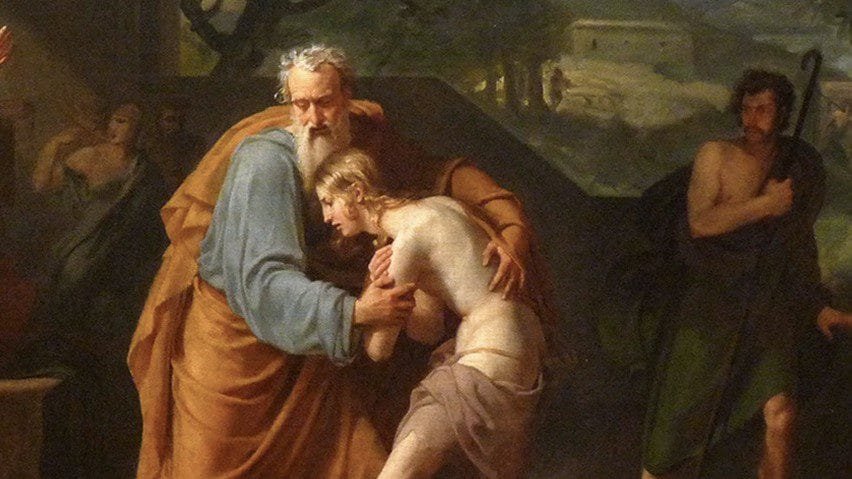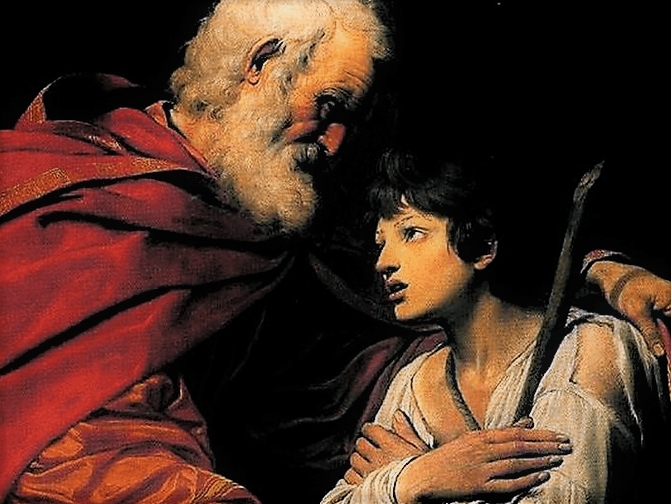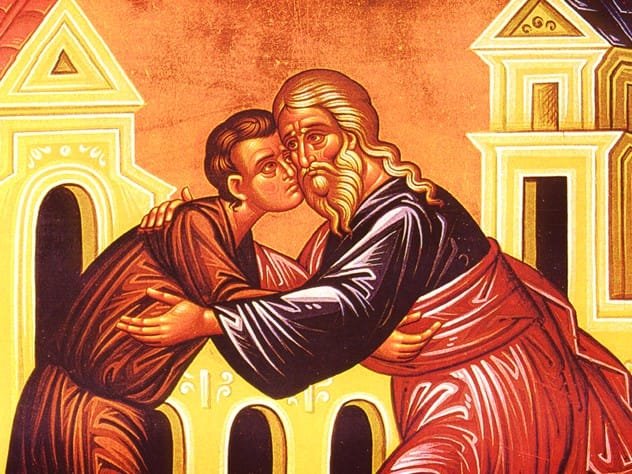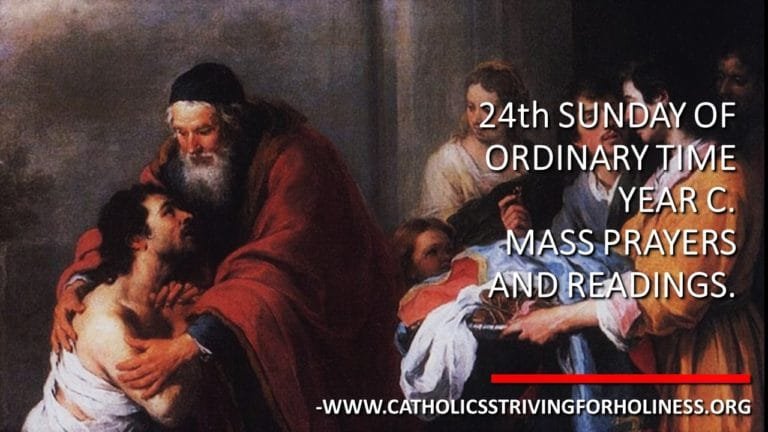POPE FRANCIS ON THE 24TH SUNDAY IN ORDINARY TIME YEAR C

ANGELUS
Saint Peter’s Square
24th Sunday in Ordinary Time Year C, 11 September 2022
____________________________
Dear brothers and sisters, buongiorno!
The Gospel of today’s Liturgy presents us the three parables of mercy (cf. Lk 15, 4-32); this is what they are called because they show God’s merciful heart. Jesus tells them to respond to the grumblings of the pharisees and the scribes, who say: “This fellow welcomes sinners and eats with them” (v.2). They are scandalized because Jesus was among sinners. If for them this is religiously scandalous, Jesus, by welcoming sinners and eating with them, reveals to us that God is just like that: God excludes no one, he wants everyone at his banquet, because he loves everyone as his children: everyone, no-one excluded, everyone. The three parables, then, summarize the heart of the Gospel: God is the Father and comes in search of us whenever we are lost.
Indeed, the protagonists of the parables, who represent God, are a shepherd who searches for the lost sheep, a woman who finds the lost coin, and the father of the prodigal son. Let us dwell on an aspect that all these three protagonists have in common. All three of them essentially have something in common, which we might define thus: restlessness for something that is missing – whether you are missing a sheep, you are missing a coin, you are missing a son – the unease of missing something, all three protagonists of these parables are uneasy because they are missing something. All three, after all, if they were to calculate, could rest easy: the shepherd is missing a sheep, but he has ninety-nine others – “Let it be lost…”; the woman is missing a coin, but has nine others; and even the father has another son, obedient, to devote himself to – why think about the one who has gone off to live a dissolute life? Nonetheless, there is anxiety in their hearts – of the shepherd, the woman and the father – about what is missing: the sheep, the coin, the son who has gone away. One who loves is concerned about the one who is missing, longs for who is absent, seeks who is lost, await who has gone astray. For he wants no-one to be lost.
Brothers and sisters, God is like this: he does not “rest easy” if we stray from Him, he is grieved, He trembles in his innermost being; and he sets out to look for us, until He takes us back into his arms. The Lord does not calculate losses and risks; he has the heart of a father and a mother, and suffers for the lack of his beloved children. “But why does he suffer if this son is a scoundrel, if he has gone?” He suffers, he suffers. God suffers for our distance and when we go astray, he awaits our return. Remember: God always awaits us with open arms, whatever the situation in life in which we are lost may be. As a Psalm says, He will “neither slumber nor sleep”, he always watches over us (cf. 121, 4-5).
Let us look at ourselves now, and ask ourselves: do we imitate the Lord in this, that is, are we anxious about what is missing? Do we have nostalgia for those who are missing, who have drifted from Christian life? Do we carry this inner restlessness, or are we serene and undisturbed among ourselves? In other words, do we truly miss those who are missing from our communities, or do we pretend and not let it touch our hearts? Do I truly miss those who are missing in my life? Or are we comfortable among ourselves, calm and blissful in our groups – “I attend a very good apostolic group…” – without compassion for those who are far away? It is not a question merely of being “open to others”, it is the Gospel! The shepherd of the parable did not say, “I have another ninety-nine sheep, why should I waste time to go and look for the lost one?” Instead, he went to look. Let us then reflect on our relationships: do I pray for those who do not believe, who have drifted away, who are bitter? Do we attract those who are distant through the style of God, which is closeness, compassion and tenderness? The Father asks us to be attentive to the children he misses the most. Let us think of someone we know, who is close to us and has perhaps never heard anyone say, “You know, you are important to God”. “But I am in an irregular situation, I have done this bad thing, that one…”. “You are important to God”, say to him. “You are not searching for him, but he is searching for you”.
Let us – men and women with restless hearts – be troubled by these questions, and pray to Our Lady, mother who never tires of searching for and taking care of us, her children.
Source: https://www.vatican.va/content/francesco/en/angelus/2022/documents/20220911-angelus.html
Emphasis mine.

ANGELUS
Saint Peter’s Square
24th Sunday in Ordinary Time Year C, 15 September 2019
Dear Brothers and Sisters, Good morning!
Today’s Gospel passage (Lk 15:1-32) begins with several people criticizing Jesus, upon seeing him in the company of tax collectors and sinners, and they scornfully say: “This man receives sinners and eats with them” (v. 2). In reality, this statement turns out to be a marvelous announcement. Jesus welcomes sinners and eats with them. It is what happens to us at every Mass, in every Church: Jesus is happy to welcome us to his table where he offers himself for us. It is a statement that we could inscribe on Church doors: “Here Jesus welcomes sinners and invites them to his table”. And in response to those who were criticizing him, Jesus tells three parables, three wonderful parables that reveal his preference for those who feel distant from him. Today, it would be nice if each of you would take up the Gospel, the Gospel of Luke, Chapter 15, and read the three parables. They are wonderful.
The first parable says: “What man of you, having a hundred sheep, if he has lost one of them, does not leave the ninety-nine in the wilderness, and go after the one which is lost, until he finds it?” (v. 4). What man of you? Not a person with good sense: he does the math and sacrifices the one to keep the ninety-nine. Whereas God does not give up. He cherishes precisely you who still do not know the beauty of his love; you who have not yet welcomed Jesus into the centre of your life; you who are unable to overcome your sin; you who, perhaps due to the bad things that have happened in your life, do not believe in love. In the second parable, you are that small coin that the Lord does not accept losing, and he searches relentlessly. He wants to tell you that you are precious in his eyes, that you are unique. No one can replace you in God’s heart. You have a place; you are you, and no one can replace you; nor me, no one can replace me in God’s heart. And in the third parable, God is the father who awaits the return of his prodigal son. God always awaits us. He does not tire, he does not lose heart. Because we, each one of us is that son embraced once again, that rediscovered coin, that sheep caressed and put back upon his shoulder. He waits every day for us to perceive his love. And you say: “But I have done my share of things, I have done too much!”. Do not be afraid. God loves you; he loves you as you are and knows that his love alone can change your life.
But this infinite love of God for us sinners, which is the heart of the Gospel, can be rejected. It is what the elder son in the parable does. He does not understand love in that moment and he has in mind more of a master than a father. It is also a risk for us: to believe in a more rigorous than merciful god, a god who defeats evil with power rather than with forgiveness. It is not so. God saves with love, not with force: offering himself, not imposing himself. But the elder son, who does not accept the father’s mercy, withdraws; he makes a greater mistake. He thinks he is just; he presumes he has been betrayed and he judges everything on the basis of his concept of justice. Thus he becomes angry with his brother and rebukes the father: “You killed the fatted calf when this son of yours came” (cf. v. 30). This son of yours: he does not call him my brother, but rather, your son. He feels like an only child. We too are mistaken when we believe we are just, when we think the others are bad. Let us not think we are good, because on our own, without the help of God who is good, we do not know how to defeat evil. Today, do not forget to take up the Gospel and read the three parables of Luke, Chapter 15. It will do you good; it will be healthy for you.
How can we defeat evil? By welcoming God’s forgiveness and the forgiveness of our brothers and sisters. It happens each time we go to confession: there we receive the love of God, which conquers our sin. It no longer exists. God forgets it. When God forgives, he loses his memory, he forgets our sins, he forgets. God is so good to us! Unlike we who, after saying “it’s okay”, remember “with interest” the harm done to us, at the very first opportunity. No, God erases evil, he makes us new inside and thus enables joy to be reborn within us, not sadness, not darkness in our heart, not suspicion, but joy.
Brothers and sisters, take courage. With God, no sin has the last word. May Our Lady who unties the knots of life, free us from the presumption of believing we are just, and make us feel the need to go to the Lord who always awaits us to embrace us, to forgive us.
Source: https://www.vatican.va/content/francesco/en/angelus/2019/documents/papa-francesco_angelus_20190915.html
Emphasis mine.

ANGELUS
Saint Peter’s Square
24th Sunday in Ordinary Time Year C, 11 September 2016
Dear Brothers and Sisters, Good morning!
Today’s [24th Sunday in Ordinary Time Year C] liturgy brings us to Chapter 15 of the Gospel of Luke, considered the chapter on mercy. It relates three parables with which Jesus responds to the grumbling of the scribes and the Pharisees, who are criticizing his actions, saying, “This man receives sinners and eats with them” (v. 2).
With these three stories, Jesus wants to make us understand that God the Father is the first one to have a welcoming and merciful attitude toward sinners. This is God’s attitude.
In the first parable, God is presented as a shepherd who leaves 99 sheep to go and look for the one that is lost. In the second, he is compared to a woman who has lost a coin and searches until she finds it. In the third parable, God is imagined as a father who welcomes the son who had distanced himself; the figure of the father reveals the heart of a merciful God, manifested in Jesus.
A common element in these parables is expressed by the verbs that mean rejoice together, join in merry-making. Mourning is not spoken of; there is rejoicing, there is celebrating. The shepherd calls his friends and neighbours and says, “Rejoice with me, for I have found my sheep which was lost” (v 6). The woman calls her friends and neighbours, saying, “Rejoice with me, for I have found the coin which I had lost” (v. 9). And the father says to his other son: “It was fitting to make merry and be glad, for this your brother was dead, and is alive; he was lost, and is found” (v. 32).
In the first two parables, the focus is on the joy that is so uncontainable that it must be shared with “friends and neighbours”. In the third parable, the focus is on the joy that springs from the heart of the merciful father and expands to the whole household. God’s rejoicing over those who return to Him repentant is intoned as never before in this Jubilee Year that we are living, as the term itself expresses: “jubilee”, that is, jubilation!
With these three parables, Jesus presents to us the true face of God, a God with open arms, a God who deals with sinners with tenderness and compassion. The parable that is most moving for everyone — because it manifests the infinite love of God — is that of the father who enfolds in a close embrace the son who has been found. What strikes us is not so much the sad story of a youth who falls into dissolute ways, but rather his decisive words, “I will arise and go to my father” (v. 18).
The path to return home is the path of hope and new life. God always expects us to resume our journey, he awaits us with patience, he sees us when we are still a long way off, he runs to meet us, he embraces us, he kisses us, he forgives us. That is how God is. That is how our Father is. And his forgiveness cancels the past and regenerates us in love. Forgetting the past — this is God’s weakness. When he embraces us, he forgives us, and forgets it. He doesn’t remember. He forgets the past. When we sinners convert and let ourselves be re-encountered by God, reproach and sternness do not await us, because God saves, he welcomes us home again with joy and prepares a feast.
Jesus himself in today’s Gospel says, “there will be more joy in heaven over one sinner who repents than over ninety-nine righteous people who have no need of repentance” (Lk 15:7).
Let me ask you a question: Have you ever thought about how each time we go to the confessional, there is joy and celebration in heaven? Have you ever thought about this? It’s beautiful.
This fills us with a great hope because there is no sin into which we may have fallen, from which, with the grace of God, we cannot rise up again. There is never a person who can’t be recovered; no one is irrecoverable, because God never stops wanting our good — even when we sin!
May the Virgin Mary, Refuge of Sinners, kindle in our hearts the confidence that was lit in the heart of the prodigal son: “I will arise and go to my father and I shall say to him, ‘Father, I have sinned against heaven and before you’” (v. 18). On this path, we can give glory to God, and his glory can become his celebration, and ours.
Source: https://www.vatican.va/content/francesco/en/angelus/2016/documents/papa-francesco_angelus_20160911.html
Emphasis mine.

ANGELUS
Saint Peter’s Square
24th Sunday in Ordinary Time Year C, 15 September 2013
Dear Brothers and Sisters, Good morning!
In the Liturgy today we read chapter 15 of the Gospel of Luke, which contains three parables of mercy: the lost sheep, the lost coin, and then the longest of them, characteristic of St Luke, the parable of the father of two sons, the “prodigal” son and the son who believes he is “righteous”, who believes he is saintly. All three of these parables speak of the joy of God. God is joyful. This is interesting: God is joyful! And what is the joy of God? The joy of God is forgiving, the joy of God is forgiving! The joy of a shepherd who finds his little lamb; the joy of a woman who finds her coin; it is the joy of a father welcoming home the son who was lost, who was as though dead and has come back to life, who has come home. Here is the entire Gospel! Here! The whole Gospel, all of Christianity, is here! But make sure that it is not sentiment, it is not being a “do-gooder”! On the contrary, mercy is the true force that can save man and the world from the “cancer” that is sin, moral evil, spiritual evil. Only love fills the void, the negative chasms that evil opens in hearts and in history. Only love can do this, and this is God’s joy!
Jesus is all mercy, Jesus is all love: he is God made man. Each of us, each one of us, is that little lost lamb, the coin that was mislaid; each one of us is that son who has squandered his freedom on false idols, illusions of happiness, and has lost everything. But God does not forget us, the Father never abandons us. He is a patient father, always waiting for us! He respects our freedom, but he remains faithful forever. And when we come back to him, he welcomes us like children into his house, for he never ceases, not for one instant, to wait for us with love. And his heart rejoices over every child who returns. He is celebrating because he is joy. God has this joy, when one of us sinners goes to him and asks his forgiveness.
What is the danger? It is that we presume we are righteous and judge others. We also judge God, because we think that he should punish sinners, condemn them to death, instead of forgiving. So ‘yes’ then we risk staying outside the Father’s house! Like the older brother in the parable, who rather than being content that his brother has returned, grows angry with the father who welcomes him and celebrates. If in our heart there is no mercy, no joy of forgiveness, we are not in communion with God, even if we observe all of his precepts, for it is love that saves, not the practice of precepts alone. It is love of God and neighbour that brings fulfilment to all the Commandments. And this is the love of God, his joy: forgiveness. He waits for us always! Maybe someone has some heaviness in his heart: “But, I did this, I did that…”. He expects you! He is your father: he waits for you always!
If we live according to the law “an eye for an eye, a tooth for a tooth”, we will never escape from the spiral of evil. The evil one is clever, and deludes us into thinking that with our human justice we can save ourselves and save the world! In reality, only the justice of God can save us! And the justice of God is revealed in the Cross: the Cross is the judgement of God on us all and on this world. But how does God judge us? By giving his life for us! Here is the supreme act of justice that defeated the prince of this world once and for all; and this supreme act of justice is the supreme act of mercy. Jesus calls us all to follow this path: “Be merciful, even as your Father is merciful” (Lk 6:36). I now ask of you one thing. In silence, let’s all think… everyone think of a person with whom we are annoyed, with whom we are angry, someone we do not like. Let us think of that person and in silence, at this moment, let us pray for this person and let us become merciful with this person. [silent prayer].
Let us now invoke the intercession of Mary, Mother of Mercy.
Emphasis mine.
Stay updated: subscribe by email for free TO OUR NEW WEBSITE www.catholicsstrivingforholiness.org (PUT YOUR EMAIL IN THE SUBSCRIBE WIDGET).
We are also in www.fb.com/Catholicsstrivingforholiness. Kindly help more people in their Christian life by liking our page and inviting your family, friends and relatives to do so as well. Thanks in advance and God bless you and your loved ones! Fr. Rolly Arjonillo

